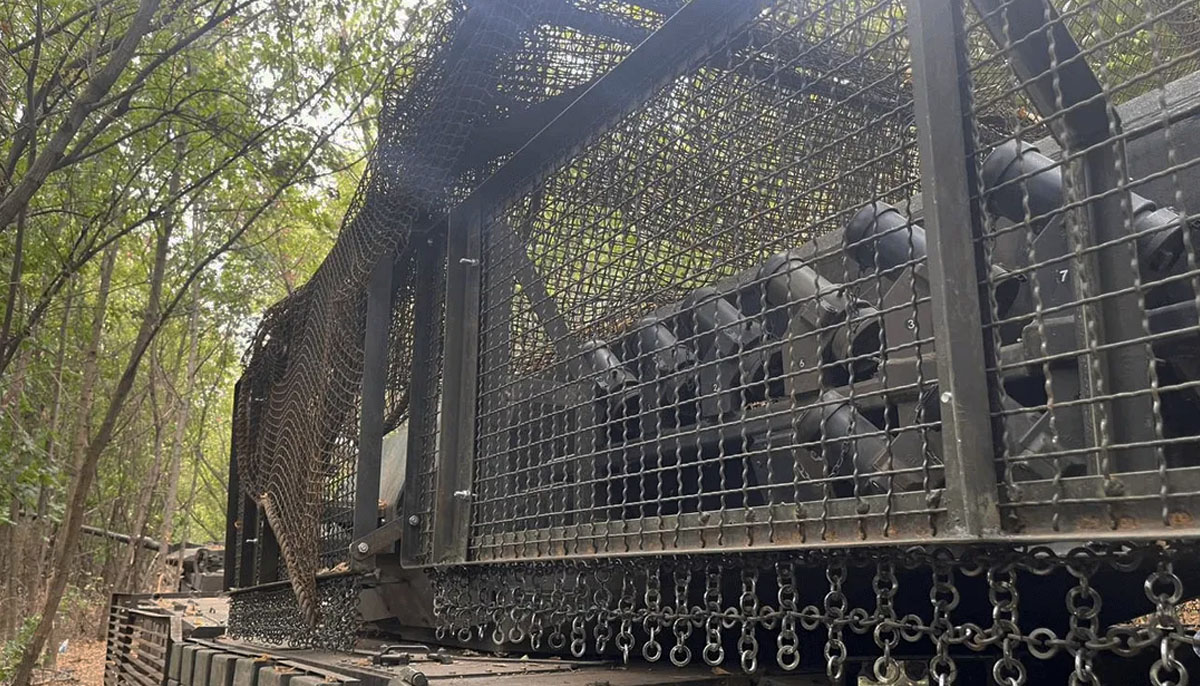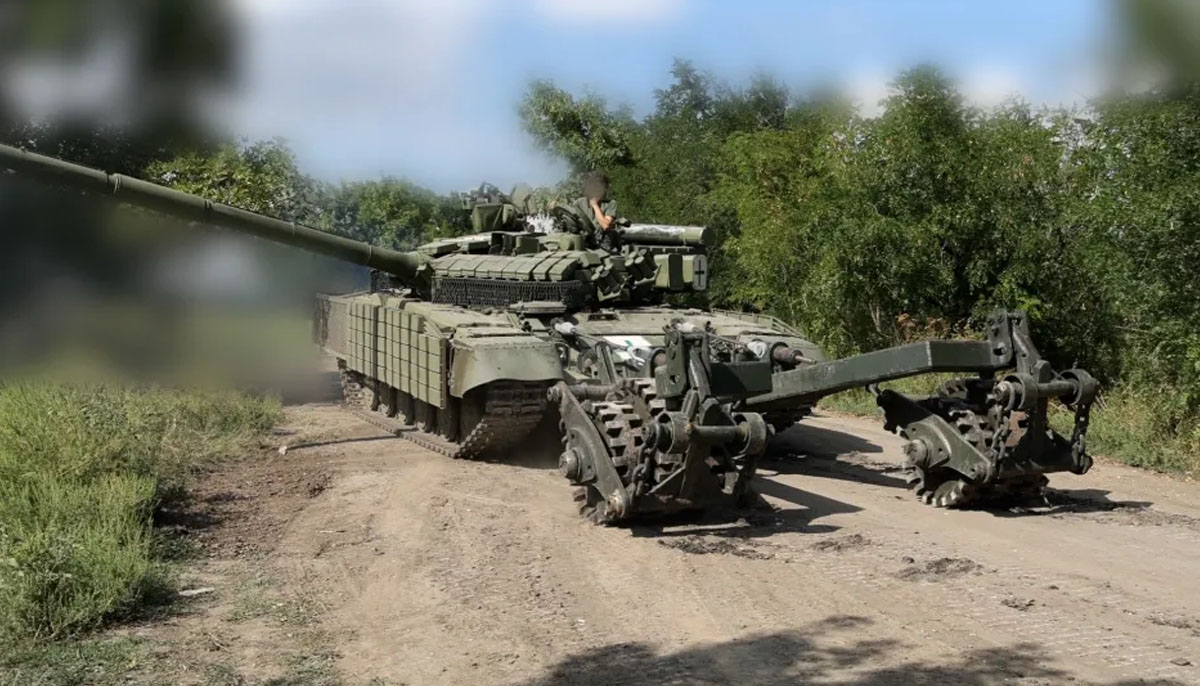The Group supplies its products to the army free of charge as part of its contribution to the defence of Ukrainian cities. Special attention is given to units in the south and east of the country, where the Group’s plants are located or where its mobilised employees are serving.
For example, there is currently fighting near the town of Pokrovsk. Strategic coking coal mines are located ten kilometres west of the town, almost in Dnipro region; their loss could result in a decline in steel production. The Group has a strong motivation to allocate money, resources and equipment to supply the local brigades, the cities and the construction of fortifications.
The metallurgists obtained old Soviet blueprints and, in dialogue with the military, began adjusting them to the realities of modern warfare. Millions of dollars of investment in product manufacturing, testing, mistakes and constant improvements are already yielding results on the front. Currently, the Group is preparing to launch truly mass-scale production of products for the military through government contracting.

Armour for armoured vehicles
Ukraine is unable to mass-produce armoured vehicles, so allies cover most of the needs of the defence forces. But Western equipment does not arrive ready for combat. Once delivered, American Abrams tanks and Bradley IFVs, as well as German Leopard 2 tanks, must get additional protection against FPV drones, which currently pose the greatest threat on the front line.
While Western manufacturers of armoured vehicles have been searching for a solution to this issue, the Ukrainian military came up with the idea of equipping them with protective screens or, as they are commonly called, “Lancet catchers.” They cover the vulnerable areas: the turret and the engine compartment. When an FPV drone attempts to hit a vehicle, it crashes into the net. This reduces for the risks to the crew and allows for the possibility that the equipment can be repaired.
The principle is simple, but someone must design and manufacture these nets. Metal screens weighing over 400 kg must be of the required strength, fit the shape and be installed correctly. Such Lancet catchers are needed in large quantities because Ukraine operates thousands of tanks, APCs and IFVs.
This is where the skills of Ukrainian metallurgists were required. Metinvest managed to master the production of metal nets for the main domestic T-64 and T-72 tanks, American M1 Abrams tanks, Bradley IFVs and it is also preparing to integrate them on various Leopard 2 modifications.
The production manager at one of the facilities said: “First, we develop blueprints, make several prototypes and install them on military equipment. The protective screens undergo combat testing, we receive feedback from the military and improve the designs if necessary. And only then do we launch mass production.”
Protective screens are manufactured while considering the specific features of each vehicle so that additional structures do not interfere with movement, do not limit the functionality of the vehicles or impede crew access. The cost of one set of protection is US$20,000. The Group provides protection kits to the military free of charge, producing 20 to 30 of them a month. In total, hundreds of them have already been delivered to the front.
The metallurgists are also mastering the production of protection for new vehicles. The plan is to begin equipping light Western armoured vehicles by the end of the year.

Mine trawls
Minefields are another issue that the Ukrainian army faces on a constant basis. According to Valeriy Zaluzhnyy, the former commander-in-chief, Russian minefields stretch for dozens of kilometres and the occupiers continuously replenish them through remote mining. Well-arranged minefields are cited as one of the reasons for the failure of the Ukrainian counteroffensive in 2023.
The TM-62 anti-tank mine contains 7 kg of explosives, which is sufficient to disable an armoured vehicle with the first hit. Tanks must be equipped with mine trawls to break through. This is a special metal structure that hangs on the tank and detonates all mines ahead.
Metinvest engineers improved an old technology, managing to integrate a trawl of their own production onto a T-72 tank and certify it. One set weighs 6.5 tonnes and production costs UAH2.5 million, including additional equipment for its installation.
During testing, the first samples withstood only three to four anti-tank mine explosions, after which they had to be taken in for repair. Subsequently, the technology was improved, allowing them to withstand eight to nine detonations, as stipulated by regulations.
The production manager at one of the facilities said: “The left and right sections of the trawl are mounted on the front of the tank, which in fact duplicate the movement of its tracks. When detonated, the roller absorbs the impact force causing a slight deformation. After that, the tank continues to move. After eight to nine detonations the tank drives back, quickly replaces the trawl and continues to move forward.”
The Group produces four sets per month and has already delivered a total of 30 units. It plans to further increase production, as the Armed Forces of Ukraine need 100 sets of trawls per month.
Steel Front
Since 2022, Metinvest Group has allocated around UAH7.7 billion for the needs of the Armed Forces of Ukraine and civilians. Of this amount, approximately UAH4.4 billion was directed specifically for the Ukrainian army’s needs, 60% of which consists of products manufactured at the Group’s enterprises. These include mobile shelters, mine trawls, protective screens for armoured vehicles, decoys of Ukrainian equipment to mislead the enemy, anti-tank hedgehogs and more.
Metinvest’s global goal is to strengthen the defence capability of the entire country, so, among the defence forces receiving assistance are the Ground Forces, the State Border Guard Service, the Defence Intelligence of Ukraine and the Security Service of Ukraine. The top priority of the Steel Front, an initiative launched by Rinat Akhmetov to support the Ukraine’s armed forces, is the brigades holding the direction from Dnipro to Avdiivka. The Group’s key enterprises are located there, and this is where its employees and their families live.
The Group plans to obtain government contracts, allowing it to multiply the production of certain types of equipment.
According to Myronenko, even allowing for a certain percentage of margin for the manufacturer, everything can be produced in Ukraine for half the price or less of comparable imported products. The Group does not rule out the possibility of exporting shelters or mine trawls after the war if there is a demand for them.
Currently, the primary task for Metinvest is to survive and assist the Armed Forces of Ukraine free of charge because only they can guarantee the future of the country’s metallurgical business and Ukraine itself.
Oleksandr Myronenko said: “The primary result of our work is when the brigade commander says in a personal conversation that we alone have provided such good conditions for them to carry out their defence. For me, that is the best feedback.”

